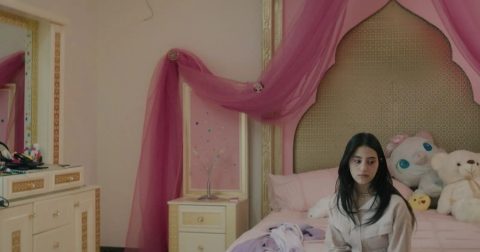Mond (2024) — the second film in Kurdish-Austrian director Kurdwin Ayub’s Sun/Moon/Stars trilogy — opens with a brutal fight scene. In her acting debut, athlete/choreographer Florentina Holzinger plays Sarah, a retired martial artist squeaking by in Vienna after a harsh televised loss.
Now she leads a dreary, unfulfilled life, teaching classes while firmly rejecting the bougie lifestyle to which her sister aspires and promotes. She’s exhausted, lost, vulnerable. Things start looking up when she receives an intriguing offer for an all-expenses-included trip to Jordan. The catch: she has to train three sisters from a wealthy family.
What appears to be a dream job quickly takes a bizarre turn once Sarah realises the sisters are living in a state of constant surveillance, isolated and unable to communicate with the outside world. Sarah is forced to sign an NDA and there’s a ton of weird house rules. Sarah isn’t allowed to go into certain parts of the house, the WiFi is blocked and the girls are not even that interested in training — they’d rather watch TV and hang out at the mall.
WTF? Why did they even bring her here in the first place?
This simple question keeps the film afloat — even when the energy lags. Scenes with Sarah interacting with the hotel bar employees raise the stakes even higher, as local gossip and speculation cloud her vision. The creepy luxury mansion where the sisters reside, with long hallways and locked doors, serves as its own menacing character and a metaphorical cage. This cage metaphor also applies to Sarah’s situation — her entire identity is tied to the martial arts ring (or “the cage”). She’s lost without it.
Like Ayub’s well-received previous film Sonne (Berlinale Encounters, 2022) about a Kurdish teenager living in Vienna, phones are integral to the plot, character development, cultural commentary and overall film aesthetic. While Sonne had more of a freewheeling, chaotic energy with faster cuts and more frequent format changes, Mond uses iPhone formats more selectively and opts for a more standard thriller vibe. But it also opens a conversation with Sonne in that both films explore a young woman’s experience navigating different cultures while emphasising ways in which modern technology can both hinder and empower young women.
Mond generally avoids the predictable tropes that plague many Netflix-y thrillers (the streaming giant is mentioned in the film). A shocking turn of events pushes the third act into high gear, allowing Ayub to subvert the expectations tied to white saviour narratives. While the film occasionally indulges in some clichés common to the European festival circuit — like filming characters from behind as they wander aimlessly or the obligatory hard techno club scene — Mond remains a taut, politically charged thriller that offers a powerful and nuanced exploration of sisterhood and self-determination.
Editor-at-large Jared loves movies and lives with Kiki in Berlin.





